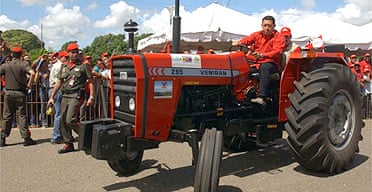A billboard of Hugo Chávez and Mahmoud Ahmadinejad looms over a motorway in Venezuela, marking the entrance to a factory designed to produce three things: tractors, influence and angst.
The tractors, lined up in shiny red phalanxes on the grounds of Veniran, a joint venture between Venezuela and Iran, are for peasants and socialist cooperatives across Latin America.
The influence, less visible but real enough, is for Mr Chávez and Mr Ahmadinejad, two presidents who hope this and other ventures will project their prestige and power.
The angst, if all goes to plan, is for Washington. Veniran might be tucked away in the backwater provincial capital of Ciudad Bolívar but it is part of a wider attempt by Mr Chávez to forge a common front against the United States.
The socialist radical is using Venezuela's vast oil wealth to strike commercial and political deals with countries that challenge the US such as Iran, Belarus, Russia and China, as well as much of Latin America and the Caribbean, to rebuff what he refers to as the "empire".
"Chávez is a global player because right now he has a lot of money that he is prepared to spend to advance his huge ambitions," said Michael Shifter, an analyst with the Inter-American Dialogue thinktank. "He has worked tirelessly to upset US priorities in Latin America."
Cocaine
Supporters say he has worked tirelessly to support the poor and marginalised, for example through a $250,000 (£121,000) loan to help farmers in Bolivia's lowlands build a coca industrialization plant, part of an effort to turn the leaf into cakes, biscuits and other legal products instead of cocaine.
"For years we have wanted to do this but no one would support us," said Leonardo Choque, leader of the Chimoré federation of coca growers. "Then the Venezuelans come and offer us a loan with very low interest rates. And no conditions." Venezuela is also funding a new university nearby.
In contrast the US is accused of bullying Andean nations into destroying coca crops without promoting equally lucrative alternative livelihoods - a big stick and a small carrot.
Of all Mr Chávez's alliances the one with Iran is the most striking. Some of the estimated 180 economic and political accords signed with the mullahs over recent years are now bearing fruit - and prompting some disquiet among the small Jewish community.
The first "anti-imperialist cars" from a joint venture reached Venezuela's roads this month, with the first batch earmarked for army officers.
There is now a weekly flight between Caracas and Tehran, with a stopover in Damascus, operated by the Venezuelan state-controlled airline Conviasa and Iran's national carrier, Iran Air. New mosques are popping up across Venezuela and universities are teaching Farsi.
Iran is to help build platforms in a $4bn development of Orinoco delta oil deposits in exchange for reciprocal Venezuelan investments.
The 4,000 tractors produced annually in Ciudad Bolívar are small beer in comparison but they have a symbolic value as agents of revolutionary change. Most are given or leased at discount in Venezuela to socialist cooperatives that have seized land, with government blessing, from big ranches and sugar plantations.
Dozens have also been sent to Bolivia to support President Evo Morales, a leftwing radical and close Chávez ally, and last week dozens more began to be shipped north to Nicaragua, whose president, Daniel Ortega, is another Chávez ally and longtime bugbear for Washington. The first batch was timed to coincide with the 28th anniversary of the Sandinista revolution.
"The idea is to help our brothers develop the land," said Reza Mahboubi, an Iranian manager at the plant. The technology was Iranian, as were the supervisors, but most of the 130 staff were Venezuelan. Asked if the objective was also to stick a finger in George Bush's eye, Mr Mahboubi merely smiled.
Sun and salsa
A colleague who asked not to be named said the Iranians had been warmly welcomed. "I love it here. It's hot and sunny and they eat rice, just like back home. Except here I go out salsa dancing."
Mr Chávez inaugurated the factory in 2005 with the then Iranian president, Mohammad Khatami. He has struck up a friendship with his successor, Mr Ahmadinejad, and hailed their "axis of unity". "The relationship is fundamentally geopolitical rather than economic," said Mr Shifter. "It tells the world that Iran, an international pariah, is welcome in Latin America, which is traditionally regarded as the strategic preserve or 'back yard' of the United States."
The alliance has cost Mr Chávez some support. Europe would be friendlier were it not for his embrace of a Holocaust-denying Islamist, said the Council on Hemispheric Affairs thinktank. That may also partly explain his low popularity rating in a recent survey of global attitudes by the Pew Foundation.
However the Venezuelan leader has calculated there is more to gain than lose. "When I come to Iran, Washington gets upset," he said on a visit earlier this month, his sixth. He has likened Iran's Islamic revolution to his own secular revolution, a mix of socialism and ideas drawn from Simón Bolívar, South America's 19th century liberator.
Backstory
They make for an odd couple. Hugo Chávez, big and bear-like, is a radical socialist who quotes Marx, leads a largely Catholic country and has a habit of breaking into song. Mahmoud Ahmadinejad, bird-like in comparison, is a radical Islamist who quotes the prophet Muhammad and is not readily associated with fun or secularism. Yet the two presidents have forged a personal and strategic relationship, and hold hands while touring joint ventures. They are linked by oil - Venezuela and Iran are big producers - and aversion to the US, which both regard as a hostile, predatory empire. Building economic and political ties, they calculate, will buttress Caracas and Tehran against Washington, the Great Satan.
